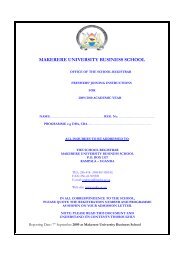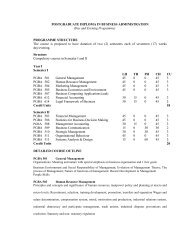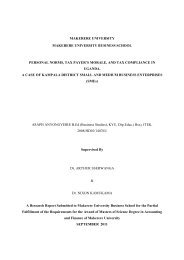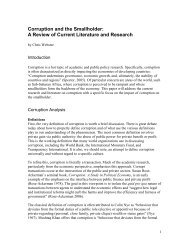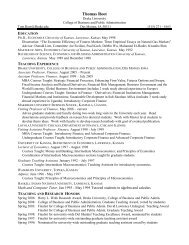13th Annual International Management Conference Proceeding
13th Annual International Management Conference Proceeding
13th Annual International Management Conference Proceeding
Create successful ePaper yourself
Turn your PDF publications into a flip-book with our unique Google optimized e-Paper software.
2.1 Dynamics of Entrepreneurial Development<br />
According to Pareek and Rao (1978), different key factors influence entrepreneurship<br />
(Figure II). Among them are:<br />
2.1.1 Individual<br />
This is the most important element in entrepreneurship that makes the decision to generate entrepreneurship<br />
in society (Schumpeter, 1970). The individual initiates, establishes, maintains, expands enterprises and strives<br />
to make it a success. It is necessary, therefore, to establish what influences the individual. KIA mainly deals<br />
with individuals at senior and middle management levels from the public, NGO and private sectors.<br />
2.1.2 Socio-cultural Factors<br />
These include: family background, behaviour, norms, attitudes and values of immediate social circle are a<br />
function of the socio-cultural milieu, and contribute to entrepreneurial development. They influence<br />
development of normative behaviour of individuals who operate under high family expectations and pressure<br />
to use reinforced values. Such behaviour reflects independence, initiative and risk taking as a result of the<br />
socialization process in the family, school and society (McCelland, 1961; Pareek and Rao, 1978).<br />
Entrepreneurs grow and internalize certain values and norms from their family and society. The influence of<br />
socio-cultural factors on individuals however, varies making some individuals getting more influenced. KIA<br />
reinforces positive values of its clientele especially through training.<br />
2.1.3 Environment<br />
The socio-political and economic policies and opportunities available plays a crucial role in exerting direct<br />
influence on entrepreneurship (GOK, 2005). Knowledge about the social, economic-political environment is<br />
important for the entrepreneur, for example, which type of enterprises are being encouraged or assistance<br />
prioritized. To KIA, such knowledge assists in preparing to exploit the environmental opportunities available<br />
by rendering entrepreneurial services with regard to its core business.<br />
2.1.4 Support System<br />
An efficient and effective support system enhances entrepreneurial success. Several organizations in the<br />
support system in Kenya of which KIA is part of, help developing entrepreneurship. These include: financial<br />
institutions; extension services; NGOs, private agencies carrying out research, and training; Educational<br />
institutions: institutes of technology and management and universities; regional administration, and industries<br />
interested in developing entrepreneurship see section. These institutions are complementary in providing<br />
entrepreneurial support. This dynamic enterprise culture development factor is the foundation of this study.<br />
Entrepreneurs often interact with the support system whose operations reinforce or discourage<br />
entrepreneurship behaviour. The quality of interaction is determined by the organisational result-orientation<br />
and working style which demonstrates the prevailing norms. Attention to such norms and inculcation of<br />
result-orientation, indeed, has relevance for the training, research and consultancy services as offered by KIA an<br />
institution that “lives entrepreneurship”. These factors are shown in Figure II.<br />
En<br />
vir<br />
on<br />
Indi<br />
vidu<br />
al<br />
Entre<br />
pren<br />
25<br />
So<br />
cio<br />
-





